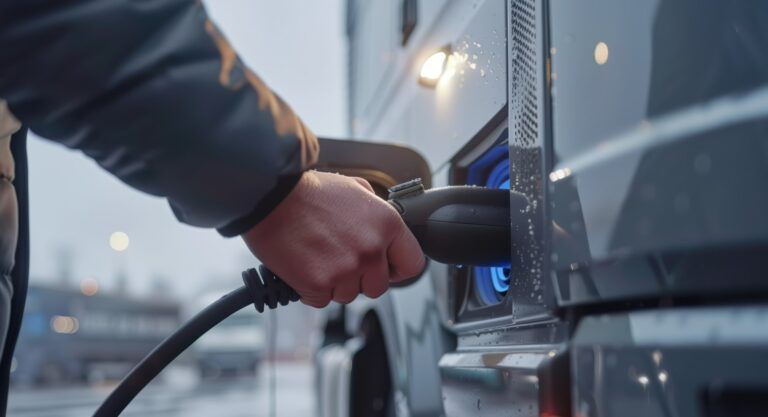The US Department of Transportation’s Federal Highway Administration (FHWA), along with the Joint Office of Energy and Transportation, has issued a Request for Information (RFI) from stakeholders about EV charging technologies and infrastructure needs for medium- and heavy-duty vehicles.
The RFI supports the US government’s commitment to build a convenient, affordable, reliable and “Made-in-America” national EV charging network. Decarbonizing freight transportation by advancing the deployment of commercial zero-emission medium- and heavy-duty vehicles is a critical part of that strategy.
The RFI seeks input in four areas to support medium- and heavy-duty EVs: 1) unique EV charger and station needs; 2) vehicle charging patterns; 3) charging technology and standardization, and 4) workforce, supply chain, and manufacturing to support charging of medium- and heavy-duty battery EVs in DOT vehicle classes four through eight, which include delivery vans, school buses, semi-tractor trucks, fire trucks, dump trucks, and tour buses.
This will inform how the federal government, including the Environmental Protection Agency and other agencies, can support the development and timely build-out of a national EV charging network that balances the needs of rapidly evolving technology and infrastructure investments in freight and a multimodal transportation system.
The goal is to collect information on the potential type and need for setting federal standards. This follows the release of the National Zero Emission Freight Corridor Strategy earlier this year.
“The Biden-Harris Administration is committed to decarbonizing freight transportation by prioritizing the deployment of zero-emission commercial medium- and heavy-duty vehicles,” said White House national climate advisor Ali Zaidi. “Building a robust, resilient and reliable national charging ecosystem for trucks – in collaboration with state and local stakeholders – is critical to ensuring the benefits of these vehicles reach the communities most impacted by transportation-related pollution and climate change.”
Acting Federal Highway Administrator Kristin White, added: “The electrification and sustainable buildout of our nation’s fleets is a critical priority for our nation’s sustainable transportation goals, to support the movement of goods and to connect communities.
“Getting information from the industry and communities impacted by future regulations is essential to helping the federal government understand how to support investments in vehicles like buses, trucks, vans, and larger vehicles to help us all move towards our Net Zero emissions goals,” she continued.
In the National Blueprint for Decarbonization, the US aims to have 30% of new medium- and heavy-duty vehicle sales be zero-emissions by 2030, and 100% by 2040. Under the Biden-Harris Administration, vehicle manufacturers and operators are using medium- and heavy-duty EVs at an increasing rate with over 160 models to choose from and more than 17,500 zero-emission trucks currently in operation – a nearly 10-fold increase from just three years ago.
This trend in EV truck adoption is driven by a combination of factors, such as declining battery costs, and the growing recognition by vehicle manufacturers and operators of the economic and environmental benefits of electrification. Together, this momentum toward electrification is further advanced by corporate sustainability goals and innovative business models that prioritize operational efficiency and environmental stewardship.
“Medium- and heavy-duty vehicle electrification is a crucial component of decarbonizing freight and reducing emissions that negatively affect health in many communities,” said Gabe Klein, executive director of the Joint Office of Energy and Transportation. “This RFI will build on the National Zero-Emission Freight Corridor Strategy released by the Joint Office earlier this year and will gain insights from stakeholders to continue to accelerate momentum toward a national fueling network for zero-emission freight.”
Comments for the RFI must be received on or before November 12, 2024.





